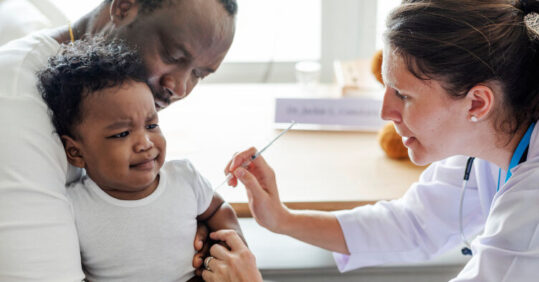Black and Asian children found to have less trust in vaccines

New research from the Royal Society for Public Health (RSPH) has found that children and young people from Black and Asian backgrounds trust vaccines less, are more concerned about the safety of vaccines, and are less aware of what vaccines are available.
Based on responses to an online survey of 1,584 children and young people aged between 11 and 16 years across the four nations, 74% of children from Black and 71% of children from Asian backgrounds trusted vaccines, compared to 85% of their white peers.
Around 28% of Asian and 30% of Black children knew about the availability of the HPV vaccine, compared to 41% of their white peers. And 69% of Asian and 68% of Black children said they were worried about vaccine safety, whereas only 54% of white children shared the same concern.
Related Article: New preceptorship package for social care nurses
Parents were top choice for children seeking vaccine information, followed by GPs and then school nurses in the survey. More than half said that vaccine programmes being available in schools would encourage them to take part.
The RSPH’s report on the data, published today, has expressed concerns about what the results could mean for vaccine uptake rates and health inequalities, and called for strategies to improve access to vaccine information and support and increasing the number of Young Health Champions.
‘It is positive to see that, overall, children and young people think vaccines are important for their health,’ said RSPH chief executive William Roberts.
‘However, it is really concerning that those children from diverse backgrounds trust vaccines less and are worried about their safety. We must do better with these groups and ensure they are empowered to make health decisions.’
Sharon White, chief executive of the School and Public Health Nurses Association (SAPHNA), meanwhile, highlighted the role that school nurses play in the school-aged immunisation programme. She said that ‘urgent’ investment into school nursing was ‘critical’, with an estimated decline in the number of school nurses making the delivery of vaccination programmes a ‘challenge’ and was ‘likely reflected in the lower uptakes we are now witnessing’.
Related Article: Applications to study nursing in England at ‘new low’
Since 2010, health leaders estimate that the number of school nurses has declined by up to 35%.
School nurses and health visitors have jointly called for investment into public health funding to tackle health inequality among babies and children ahead of the Spring Budget due to be announced tomorrow (15 March).
The Institute of Health Visiting (iHV) and SAPHNA have this week expressed concerns that current funding will be insufficient to deliver on the Government’s plans for childhood health.
Related Article: Paul Rees appointed as permanent NMC chief executive and registrar

See how our symptom tool can help you make better sense of patient presentations
Click here to search a symptom




